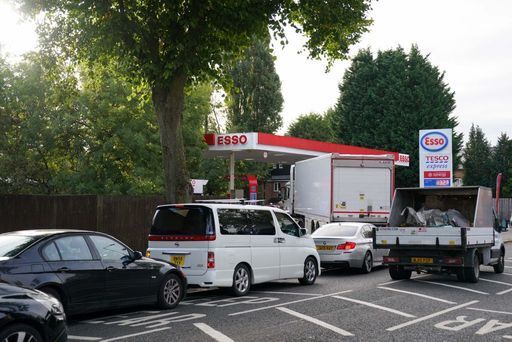Fuel crisis: Social media blamed as panic-buying continues
Drivers are flocking to stations as pictures of them being refilled are shared online, industry leader says

Your support helps us to tell the story
From reproductive rights to climate change to Big Tech, The Independent is on the ground when the story is developing. Whether it's investigating the financials of Elon Musk's pro-Trump PAC or producing our latest documentary, 'The A Word', which shines a light on the American women fighting for reproductive rights, we know how important it is to parse out the facts from the messaging.
At such a critical moment in US history, we need reporters on the ground. Your donation allows us to keep sending journalists to speak to both sides of the story.
The Independent is trusted by Americans across the entire political spectrum. And unlike many other quality news outlets, we choose not to lock Americans out of our reporting and analysis with paywalls. We believe quality journalism should be available to everyone, paid for by those who can afford it.
Your support makes all the difference.People who post videos and pictures on social media of tankers refilling petrol stations are fuelling panic buying at forecourts, an industry leader has claimed.
Brian Madderson, chairman of the Petrol Retailers Association (PRA), said consumers were watching the footage then rushing to the station in question to fill up their cars, further depleting supplies.
His comments come less than 24 hours after prime minister Boris Johnson put the army on standby to deal with the crisis should they be needed, despite earlier assurances from George Eustice, the environment secretary, that there were "no plans" to call in the troops.
Drivers are ignoring ministers' pleas for calm and panic buying showed no sign of abating on Tuesday, amid chaotic scenes at pumps across the country.
A video posted on social media appeared to show a man pulling a knife on a fellow motorist at a forecourt in London, while brawls and fights have been reported at other stations.
Ms Madderson said retailers continue to report sky-high demand.
He told BBC Radio 4: "Disappointingly the messages I'm getting this morning from our retailers are that panic buying does continue.
"One of the reasons for this is social media. As soon as the tanker arrives at a filling station people on social media are advising that a tanker has arrived and it is like bees to a honeypot."
He added: "Everyone flocks there and within a few hours it is out again."
Britain is in the grip of a supply chain crisis that is affecting supermarket shelves and businesses - as well as fuel supplies.
The country is experiencing an acute shortage, thought to be around 100,000, of heavy goods vehicle (HGV) drivers.
The problem is a long-standing one that has been exacerbated by Brexit, the Covid pandemic and low wages.
The shortage means that companies selling fuel are unable to replenish their stocks quickly enough to meet consumer demand. The government insists that there are adequate supplies of petrol and diesel.
Over the weekend ministers announced a raft of measures - including granting temporary visas to 5,000 foreign workers as well as training up new drivers in the UK - but industry figures have warned this is not enough to alleviate the crisis.
In a separate intervention on Tuesday Mike Granatt, a former government official who set up the civil contingencies secretariat and worked on the petrol crisis of 2000, warned that that panic buying could continue if consumer behaviour didn't change.
He said that prioritising specific workers would not work as he called on “hiding” Mr Johnson to show leadership.
He told Radio 4: “When we started to prioritise people [in 2000] we ended up prioritising about a third of the economy and it didn’t work even then.
“Hospitals found themselves short of staff not because their staff did not have priority but because school teachers hadn’t.”
Calling on Mr Johnson to act, he added that it was only when former prime minister Tony Blair - in charge at the time of the 2000 crisis - “explained to people that unless they slowed down [buying petrol] the system would never really get back into balance”.
He added: “It’s called leadership. Someone needs to stand up and say this to people rather than hide away.”
Labour has blamed the government's lack of planning for the ongoing supply chain issues.
Nick Thomas-Symonds, the shadow home secretary, said he wrote to Grant Shapps, his counterpart, in July asking for a plan to deal with the shortages.
He told Sky News: "We got very short shrift from Grant Shapps who wrote back to us in the first week of August saying, in his words, he wouldn't be using foreign labour to solve this issue.
"The government says it wants to train up, and I'm in favour of training up HGV drivers, but it hasn't done that to a sufficient extent."
"It's this government that has ended up in this situation through its chronic lack of planning and sheer incompetence," he added.
Mr Shapps earlier said there are "tentative signs" that pressure on filling stations is beginning to ease.
In a pooled clip for broadcasters, Mr Shapps said there was more petrol in the filling stations, although he acknowledged it would not have an immediate impact on the queues for fuel.
"There are now the first very tentative signs of stabilisation in forecourt storage which won't be reflected in the queues as yet," he said.
"But it is the first time that we have seen more petrol actually in the petrol stations.
"As the industry said yesterday, the sooner we can all return to our normal buying habits, the sooner the situation will return to normal."
Join our commenting forum
Join thought-provoking conversations, follow other Independent readers and see their replies
Comments